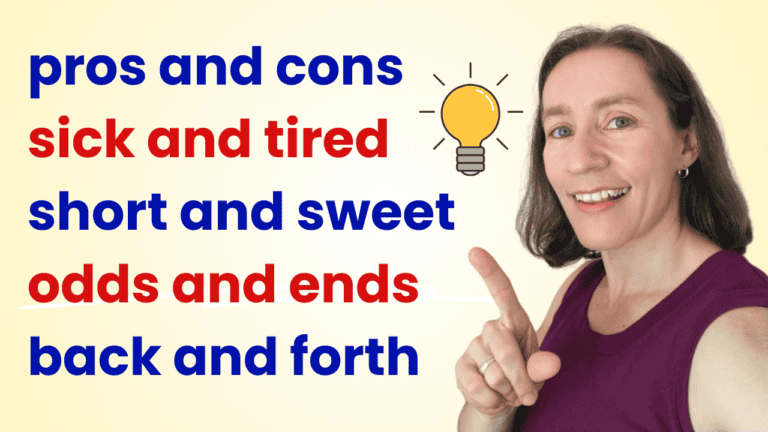
Today you’re going to learn some English expressions with the words “easy” and “hard.” These individual words have simple definitions, but when they are used inside idioms, the whole expression might have a different meaning than you expect. If you’re interested in learning more idioms, check out my 300+ English Idioms in 30 Days Course.
English idioms with “easy”
take it easy
The expression “take it easy” is used in two ways. It means to be relaxed and not do very much activity; for example, “I had a busy week, so I’m just gonna take it easy this weekend” – means I will relax, rest, and not do very many things.
If you tell someone “Take it easy!” as a command, you are telling them to be calmer and not so excited or upset. Let’s say you make a joke and someone gets offended and starts getting angry at you – you might say “Take it easy, I was just kidding.”

get off easy
If you “get off easy,” it means you receive a lighter punishment for a crime or a bad action. You deserved a more serious punishment, but you “got off easy” – you received a much less serious punishment.
For example, if Joe stole some money from the company where he works, but instead of getting fired (losing his job) he only got a reprimand (that’s a strong negative comment) from his supervisor, we could say Joe got off easy.
easy does it
This informal expression means “proceed slowly and carefully.” We often use it when someone needs to be very gentle and attentive due to a delicate physical situation.
If you are moving to a new house, and you have a large, fragile glass vase that needs to be packed in a box and carried to the moving truck, you might tell the movers (the people carrying and transporting your things), “Easy does it” as they are handling the vase.

easier said than done
This expression is pretty clear – it means it is simple to SAY something, but difficult to actually DO it. Let’s say your friend is starting a new business, and he tells you, “I just need to find 1,000 customers and then it’ll be very profitable!” – You might respond, “Easier said than done” because it’s easy to say you will get lots of customers, but difficult in practice to do all the marketing, customer service, etc.
on easy street
When you say someone is “on easy street,” it means that person is in a secure and comfortable situation (often financially – they have enough money that they don’t have to worry about it). For example, “Ever since she inherited $5 million from her father, she’s been on easy street.”

English idioms with “hard”
be hard on someone
To “be hard on someone” means to treat that person very strictly or harshly. For example, “My parents were quite hard on me – they punished me for any grades lower than 90%.”
We usually use this expression when talking about a person in a position of some authority (a parent, teacher, boss, etc.) having very high standards for a person they supervise (a child, student, employee, etc.) and punishing or reprimanding them if they don’t meet those standards.
between a rock and a hard place
If you’re “between a rock and a hard place,” it means you have two options, but both are difficult or bad – or choosing one will cause problems for the other. Let’s say your job is extremely stressful and you want to quit… but if you quit, then you won’t have enough money to pay your bills.
So your options are A) stay in a job and have money, but be stressed all the time; or B) quit the job and feel better, but then have no money. You are between a rock and a hard place.

hard to swallow
Something that is “hard to swallow” is difficult to believe or accept. Let’s say your passion is writing and you’ve been trying to publish a book for the past ten years, but nobody is interested in reading your work. The fact that you’ve invested many years in your book, but it’s still not successful, would be hard to swallow (difficult to accept).
hard pass
“Hard pass” is a slang way to say “no, absolutely not” and express that you definitely DON’T want to do something. There’s a tradition in some countries (such as Canada and the northern U.S.) to jump into the ocean in the middle of winter, when the water is extremely cold. If your friends invite you to do this, but you hate the cold, you would say “Hard pass!”

no hard feelings
This is an informal way to say “there’s no anger or resentment (bad feelings against someone that continue for a long time).” Imagine your friend is getting married next month and has invited you to his wedding, but your boss has scheduled you to take a business trip at the same time, so you won’t be able to attend your friend’s wedding. When you tell your friend this unfortunate fact, he might say “I understand – no hard feelings” to express that he won’t be angry at you for missing his wedding.
Learn more:










